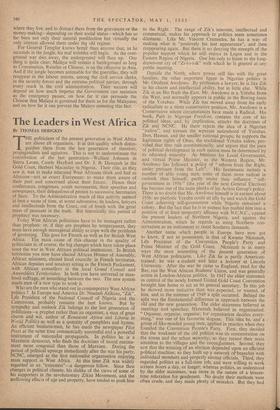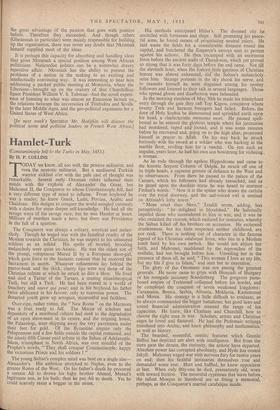The Leaders in West Africa
By THOMAS HODGKIN THE politicians of the present generation in West Africa are above all organisers. It is this quality which distin- guishes them from the last generation of theorists, propagandists and agitators. This is not to underestimate the contribution of the last generation—Wallace Johnson in Sierra Leone, Casely Hayford and Dr. J. B. Danquah in the Gold Coast, Herbert Macaulay in Nigeria. Their role, as they, saw it, was to make educated West Africans think and feel as Africans—not as ersatz Europeans: to make them aware of their past and concerned about their future. Hence their conferences, congresses, youth movements, their speeches and newspapers, their delegations of protest to successive Secretaries of State. To the Administration much of this activity seemed at best a waste of time, at worst subversive; its leaders, lawyers and intellectuals from the Coast, out of touch with the great mass of peasants in the bush. But historidally this period of prophecy was necessary.
Today West African politicians have to be managers rather than prophets: or, if they are prophets by temperament, they must have ,enough managerial ability to cope with the problems of governing. This goes for French as well as for British West Africa. The. main .cause of this change in the quality of politicians is, of course, the big changes which have taken place since the war in West African political institutions. In British territories you now have elected African Houses of Assembly, African ministers, elected local councils: in French territories, African deputies and senators sitting in the French Parliament, with African conseillers in the local Grand Conseil and Assemblees Territoriales. In both you have universal or man- hood suffrage, or something between the two. The new system needs men of a new type to work it.
Who are the men who stand out in contemporary West African politics ? In Europe and America Dr. Nnamdi Azikiwe, "Zik", Life President of the National Council of Nigeria and the Cameroon, probably remains the best known. But by sympathy and outlook Zik belongs to the last generation of politicians—a prophet rather than an organiser, a man of great charm and wit, author of Renascent Africa and Liberia , in World Politics as well as a quantity of pamphlets and hymns. An efficient business-man, he has made the newspaper Pilot Press at the same time commercially successful and a powerful instrument of nationalist propaganda. In politics he is a Mazzinist democrat, who finds the doctrines of moral rearma- ment more congenial than those of Marxism. During the period of political upsurge immediately after the war his party, NCNC, emerged as the first nationalist organisation enjoying, mass support in West Africa. At this time Zik was widely regarded as an "extremist"—a dangerous fellow. Since then changes in political climate, his dislike of the views of some of his supporters in the revolutionary Zikist Movement, and the mellowing effects of age and property, have tended to push him to the Right. The range of Zik's interests, intellectual and commercial, makes his approach to politics seem sometimes dilettante. Like Mr. Vincent Crummles., he has a way of making what is "positively his last appearance", and then reappearing again. But there is no denying the strength of the popular support which he still enjoys in Lagos and in the Eastern Region of Nigeria. One has only to listen to the long- drawn-out cry of "Zi-i-i-i-ik" with which he is greeted at any public meeting.
Outside the North, where power still lies with the great families, the other important figure in Nigerian politics is Mr. Obafemi Awolowo. By profession a lawyer, he is like Zik in his charm and intellectual ability, but in little else. While Zik is an Ibo frqm the East, Mr. Awolowo is a Yoruba from the West, and normally appears in public in the flowing tunic of the Yorubas. While Zik has moved away from his early radicalism to a more conservative position, Mr. Awolowo is a Conservative whom circumstances have made a Radical. His book, Path to Nigerian Freedom, contains the core of his political ideas, and, by implication, attacks the doctrines of Zik and NCNC. He there rejects the idea of a Nigerian "nation", and stresses the separate nationhood of Yorubas, Ibos, Hausas, and the smaller national groups; he supports the legitimate rights of Obas, the traditional Yoruba rulers, pro- vided that they rule constitutionally, and argues that the pace of political development in each nation. must be determined by its educated minority. As Minister for Local Government, and virtual Prime Minister, in the Western Region, Mr. Awolowo has followed a policy of " reform from the Right, under pressure from the Left". His lieutenants include a number of able young men, some of them more radical in outlook than himself; partly under their influence " self- government in 1956 " (the_ year of the next General Election) has become one of the main planks of his Action Group's policy. There is no doubt that Mr. Awolowo himself is in earnest about 1956: no patriotic Yoruba could sit idly by and watch the Gold Coast achieving self-government while Nigeria. remained a colony. But the fact that he is in earnest has pushed him into a position of at least temporary alliance with N.C.N.C., against the present leaders of Northern Nigeria, and against the Administration, which he regards as using Northern con- servatism as an instrument to resist Southern demands.
Another name which people in Europe have now got to know, if not to pronounce, is that of Kwame Nkrumah, Life President of the Convention People's Party and Prime Minister of the Gold Coast. Nkrumah is in many ways the most interesting of the present generation of West African politicians. Like Zik he is partly American- trained; he was a student and later a lecturer at Lincoln University. After the war he came to England, read for the Bar, ran the West African Students' Union, and was generally active in London-African politics. In 1947 the elder statesmen in control of the newly formed United Gold Coast Convention brought him home to act as its general secretary. hi this job he showed more initiative than was expected, or wanted, of him, and in the summer of 1949 a split occurred. Behind the split was the fundamental difference in approach between the old and the new generation. The elder statesmen believed in meetings and speeches: Nkrumah believed in organisation`. " Organise, organise, organise; for organisation decides every- thing," was one of his favourite slogans. This idea he, and a group of like-minded young men, applied in practice when they founded the Convention People's Party. First, they decided that the weakness of the old politics was its concentration on the towns and the urban minority; so they turned their main attention to the villages and the cocoajarmers. Second, they saw that the winning of an election depended upon an efficient political machine; so they built up a network of-branches with individual members and properly elected officials. Third, they regarded politics as a full-time job, and were willing to work sixteen hours a day, or longer; whereas politics, as understood by the elder statesmen, was more in the nature of a leisure- time relaxation for gentlemen. No doubt their methods were often crude, and they made plenty of mistakes. But they had the great advantage of thq passion that goes with positive beliefs. .Therefore they , succeeded. And though others (Gbedemah in particular) were mainly responsible for building up the organisation, there was never any doubt that Nkrumah himself supplied most of the ideas.
It is perhaps this capacity for absorbing and handling ideas that gives Nkrumah a special position among West African politicians. Nationalist politics can be a somewhat dreary repetitive affair. Nkrumah has the ability to present the problems of a nation in the making in an exciting and intellectually convincing way. 'It was interesting to hear him addressing a packed public meeting at Monrovia, where the Liberians—brought up on the oratory of that Churchillian figure President William V. S. Tubman—had the novel experi- ence of listening to what was almost an Extension lecture on the relations between the universities of Timbuktu and Seville in the later Middle Ages, and the geo-political arguments for a United States of West Africa.
[In next week's Spectator 'Mr. Hodgkin will discuss the political scene 'and political leaders in French West Africa.]



































 Previous page
Previous page